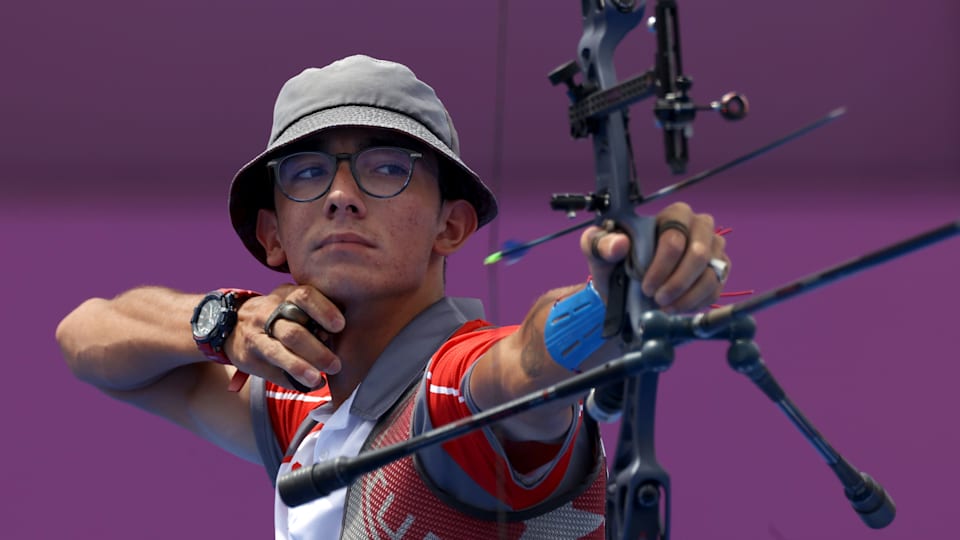Olympic archery champion Mete Gazoz: "If I shoot bravely I can beat anyone"
The Turk shares the challenges of dealing with popularity in his home country and explains how mental training changed his game.

Turkish archer Mete Gazoz has achieved superstar status in his country since becoming an Olympic champion in Tokyo two years ago.
“After the Olympic Games, I can’t walk normally on the street,” the 24-year-old confessed during an exclusive interview.
“People always come up to me for a picture, even when I’m at a restaurant. Other people then join them, and I can’t eat anything! But it’s good because I won a gold medal for my country, and it’s beautiful to be recognised,” he added, accompanied by a smile.
Interestingly, Gazoz in Turkish translates to ‘surprise’, but despite his youthful age, he has been a household name in the sport for several years now. “I want to win another individual gold at the Olympics and make history. I also want to go to the Games ten times,” he added.
Gazoz: Celebrated by best-selling author
The archer secured his first significant achievement at senior level in 2018 by claiming gold at the Archery World Cup event in Berlin, Germany.
It was in that occasion that he began displaying his trademark celebration, lowering his clenched fist in front of his face, an idea cultivated by his coach Yusuf Göktuğ Ergin: “Now I use it all the time: if I win some competition, I do it!”
From coach Ergin, Gazoz also inherited his signature bucket hat: “He used it during the 2008 Olympics, but he didn’t want to give it to me because he felt it was part of his history. He challenged me to steal it from him, and I did it. Now I’ve been using it for my whole archery life, and it has become a lucky charm for me,” Gazoz admitted.
Over the past few years, the Turk has captivated the imagination of an entire nation, where archery has been a traditional sport since the Ottoman era, and even acclaimed best-selling author Paulo Coelho dedicated a book to him, ‘The Archer’s Way.’
“I don’t know why he did it, but it’s a big honour for me to know that a legend like him watched my competitions,” the Tokyo 2020 gold medallist said.
BERLIN, GERMANY - JULY 07: In this handout provided by the World Archery Federation, Mete Gazoz of Turkey celebrates his win during the Men's recurve finals during the Hyundai Archery World Cup 2019 Stage 4 on July 7, 2019 in Berlin, Germany.
A strict fitness regime
Archery is a sport that often goes underestimated in terms of the fitness it demands. In the Olympic tournament, reaching the final can lead to burning up to 1,000 calories, and heart rates can surge to peaks of 170 beats per minute.
“During the season, in training, I shoot around 600 arrows every day. So we need big muscles in our arms and hands,” Gazoz explained.
His training regimen includes running and cardio drills to aid rapid stabilisation of his heart rate during competitions. During the off-season, gym sessions can stretch up to 10 hours, encompassing rigorous shoulder and core workouts.
"It's my job, but I also enjoy it," he said.
In addition to his dedication to archery, the Turkish athlete is an esports enthusiast and is well-acquainted with technology. His team employs cutting-edge systems to track his heart rate variability (HRV), while his technique undergoes video analysis using a high-speed camera.
However, mental training and visualisation have been mostly the key factors in Gazoz’s success.
“I have a dedicated mental coach,” he revealed.
“I learned that it’s important to use all my five senses to imagine my perfect technique, and when you practise it with your mind repeatedly, the brain can’t distinguish reality from imagination anymore.”
Cultivating the right mindset holds a profound impact on archery performances: “Once at the European Games in Minsk, I lost in the fist rounds because I was scared to shoot,” he confessed.
“I didn’t shoot (to) win, I shot not to lose and that’s a big difference. So I learned this: I have to be brave because if I shoot bravely I can beat anyone.”
